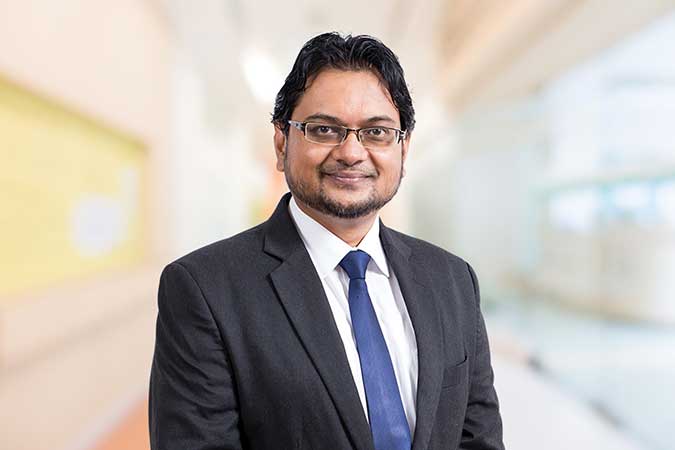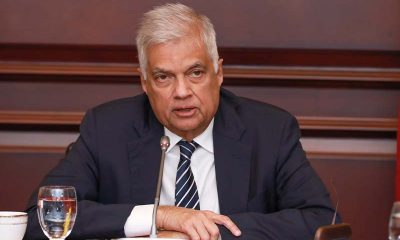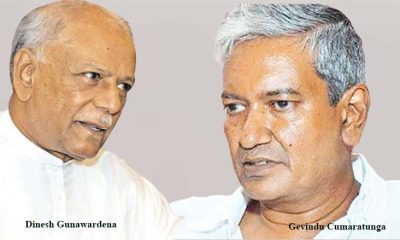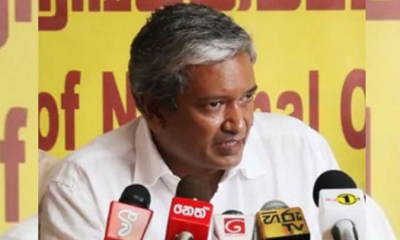News
Governance issues, etc., will have to be sorted out to avert further debt restructuring: Verité Research

By Rathindra Kuruwita
Unless Sri Lanka addressed its governance issues, the country would have to restructure its debt again like most countries that had unsustainable levels of corruption, Executive Director of Verité Research Nishan de Mel said in a recent televised interview.
Dr. De Mel said that as the government had decided to pay the Employees’ Provident Fund (EPF) only 9% for its investment until 2038 instead of the average Treasury bond interest rate of 13.5 percent, it would lose 12 trillion rupees.De Mel also said that Domestic Debt Optimization (DDO) was a phrase that the Sri Lankan government coined.
“Domestic debt restructuring usually means making credit owners take a loss for the benefit of the government. The word commonly used for this is restructuring, optimisation is a word that we have come up with,” he said.
De Mel said that the government’s proposal was to reduce the interest paid on the money at EPF and other such funds to 9.1 percent until 2038. However, the average interest paid for Treasury bonds over recent years was 13.5 percent, which is almost 50 percent more than the proposed interest for EPF, he said.
“We know the interest rates for Treasury Bonds because the government has released information about the interest rates of bonds issued because foreign creditors have been asking for transparency. By the end of 31 May this year, the average interest rate given to bondholders was 13.5 percent,” he said.
There had been years when interest rates for Treasury bills were below 9.1 percent. However, it was unlikely that the interest rates offered on Treasury bills would fall below 9.1 percent, he said. Sri Lanka was going through an uncertain time and governments could only lure people into buying bonds by offering attractive interest rates, de Mel added.
“We still can’t borrow from bond markets. So, the government will offer higher interest rates when it borrows from the domestic market. During the past two years, the government has paid about 30 percent interest to borrow from the domestic market. It is unlikely that interest rates for bonds will be less than 13.5 percent in the future,” he said.
De Mel said that at present there are 3.4 trillion rupees at the EPF, and it will reach about 25 trillion by 2038 at 13.5 percent interest. However, EPF funds would only grow to 13 trillion at 9.1 percent interest.
“That’s 12 trillion rupees less at 9.1 percent,” he said.
The Central Bank had a Monetary Board taking decisions on the EPF and there was a conflict of interest as CBSL was also entrusted with restructuring debt, de Mel said.
“A lot of people ask me why I am using 13.5 percent to calculate the losses. They tell me that the EPF already receives less than 13.5 percent in interest. The EPF is late in producing annual reports. The last available report was for 2020. The Central Bank produces its annual reports every year, but the EPF reports are delayed. There are many allegations about what happened. If someone tells me that EPF receives lower interest rates than the market rate for treasury bonds, that is another serious problem. All private sector employees are compelled to be a member of the EPF, so why are EPF beneficiaries receiving less than market rates?” he asked.
There are several pension funds, and CBSL workers have a special pension fund. De Mel said he was not aware if that pension fund, too, had been restructured.Although the parliament had approved a resolution on the domestic debt restructuring, the government could not change the interest rates given to EPF without changing some laws, he said.
“The laws governing the EPF say that the Central Bank must publish all investments it makes with EPF money. However, when we look at EPF’s financial statements, they have misinterpreted the above clause. Instead of listing out every investment, they are listing out every type of investment. This way, people can’t figure out what’s going on,” he said.
Those who are EPF beneficiaries will lose about 70 percent of the real value of their money because of inflation and the lower market rate of interest. However, foreign investors are only getting a 30 percent loss, he said.
“This is unequal treatment. There are two factors needed for sustainable domestic debt restructuring. One is that foreign creditors must take a deep haircut—over 50 percent. Secondly, the governance issues in a country must be addressed. Most countries have to restructure their debt more than once. And these countries have serious governance issues. So, to attain sustainability, we need foreign creditors to get a deeper haircut and we have to address our serious governance issues,.”
News
US sports envoys to Lanka to champion youth development

The U.S. Embassy in Colombo welcomed the U.S. Sports Envoys to Sri Lanka, former National Basketball Association (NBA) and Women’s National Basketball Association (WNBA) players Stephen Howard and Astou Ndiaye, from June 8 through 14.
The Public Diplomacy section of the U.S. Embassy said that it would launch a weeklong basketball program intended to harness the unifying power of sports, made possible through collaboration with Foundation of Goodness and IImpact Hoop Lab.
While in Sri Lanka, Howard and Ndiaye, both retired professional basketball players, will conduct a weeklong program, Hoops for Hope: Bridging Borders through Basketball. The Sports Envoys will lead basketball clinics and exhibition matches and engage in leadership sessions in Colombo and Southern Province for youth aged 14-18 from Northern, Uva, Eastern and Western Provinces, offering skills and leadership training both on and off the court. The U.S. Envoys will also share their expertise with the Sri Lanka Basketball Federation, national coaches, and players, furthering the development of basketball in the country. Beyond the clinics, they will collaborate with Sri Lankan schoolchildren to take part in a community service project in the Colombo area.
“We are so proud to welcome Stephen and Astou as our Sports Envoys to Sri Lanka, to build on the strong people-to-people connections between the United States and Sri Lanka,” said U.S. Ambassador Julie Chung. “The lessons that will be shared by our Sports Envoys – communication, teamwork, resilience, inclusion, and conflict resolution – are essential for leadership development, community building, equality, and peace. The U.S. Sports Envoy program is a testament to our belief that sports can be a powerful tool in promoting peace and unity.”
News
Rahuman questions sudden cancellation of leave of CEB employees

SJB Colombo District MP Mujibur Rahuman in parliament demanded to know from the government the reasons for CEB suspending the leave of all its employees until further notice from Thursday.
MP Rahuman said that the CEB has got an acting General Manager anew and the latter yesterday morning issued a circular suspending leave of all CEB employees with immediate effect until further notice.
“We demand that Minister Kanchana Wijesekera should explain this to the House. This circular was issued while this debate on the new Electricity Amendment Bill was pending. There are many who oppose this Bill. The Minister must tell parliament the reason for the urge to cancel the leave of CEB employees,” the MP said.However, Speaker Mahinda Yapa Abeywardena prevented Minister Wijesekera responding to the query and said that the matter raised by MP Rahuman was not relevant.
News
CIPM successfully concludes 8th Annual Symposium

The Chartered Institute of Personnel Management (CIPM) successfully concluded the 8th Annual CIPM Symposium, which took place on 31st May 2024. Themed “Nurturing the Human Element—Redefining HRM in a Rapidly Changing World,” the symposium underscored the pivotal role of human resource management (HRM) in today’s dynamic global landscape. Since its inception in 1959, CIPM has been dedicated to advancing the HR profession through education, professional development, and advocacy, solidifying its position as Sri Lanka’s leading professional body for HRM.
Ken Vijayakumar, the President of the CIPM, graced the occasion as the chief guest. The symposium commenced with the welcome address by the Chairperson, Prof. Arosha Adikaram, followed by the Web Launch of the Symposium Proceedings and Abstract Book by the CIPM President. The event featured distinguished addresses, including a speech by Chief Guest Ken Vijayakumar, President of CIPM, and an address by Guest of Honor Shakthi Ranatunga, Chief Operating Officer of MAS Holdings Pvt. Ltd., Sri Lanka.
The symposium also featured an inspiring keynote address by Prof. Mario Fernando, Professor of Management and Director of the Centre for Cross Cultural Management (CCCM) at the University of Wollongong, Australia.
Vote of Thanks of the inauguration session was delivered by Dr. Dillanjani Weeratunga, Symposium Co-chair.
The symposium served as a comprehensive platform for researchers to present their findings across a wide range of critical topics in HRM. These included Cultural Diversity and Inclusion, Talent Development and Retention, Ethical Leadership and Corporate Social Responsibility, Adapting to Technological Advancements, Mental Health and Well-being at Work, Global Workforce Challenges, Employee Empowerment, and Reskilling and Upskilling.
The plenary session was led by Prof. Wasantha Rajapakse. Certificates were awarded to the best paper presenters during the valedictory session, followed by a vote of thanks delivered by Kamani Perera, Manager of Research and Development.
The annual symposium of CIPM was a truly inclusive event, attracting a diverse audience that spanned undergraduates, graduates, working professionals, research scholars and lecturers. This widespread interest highlights the symposium’s significance in the field of HRM, offering a unique opportunity for everyone to network and learn from scholarly brains.The CIPM International Research Symposium was sponsored by Hambantota International Port, Sri Lanka Institute of Information Technology (SLIIT), E B Creasy & Co. PLC, and Print Xcel Company.
























